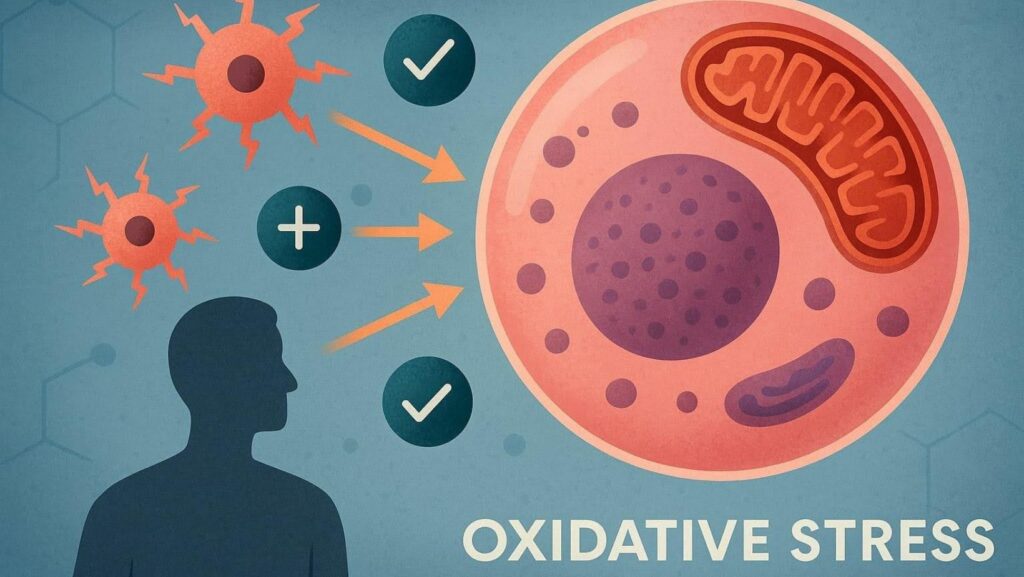Oxidative stress has become a key focus in health and wellness conversations, and for good reason. It occurs when the body experiences an imbalance between free radicals (unstable molecules) and the antioxidants that keep them in check. This imbalance can lead to damage in cells, tissues, and even DNA, contributing to aging and chronic health conditions over time.
Understanding oxidative stress isn’t just for scientists or medical professionals. It affects everyone, from active individuals to those simply trying to stay healthy. While lifestyle habits like a nutrient-rich diet and regular exercise are important, additional support may come from science-backed nutrients.
Emerging research suggests that cellular health can also be supported by nutrients such as a C15 supplement, which helps support cellular repair and protection. Taking a closer look at how oxidative stress works is the first step toward managing it effectively.
Oxidative Stress 101
Oxidative stress happens when there’s an overload of free radicals in the body and not enough antioxidants to neutralize them. Free radicals are reactive molecules that can damage cells, and while they’re a normal byproduct of metabolism, certain conditions cause them to build up at harmful levels.
This imbalance can affect various systems in the body, leading to tissue damage and contributing to long-term health issues. Environmental factors like pollution, excessive sun exposure, and processed foods can all increase free radical production. Left unchecked, oxidative stress plays a role in the development of inflammation and age-related diseases.
What Are Free Radicals?
Free radicals are unstable molecules that contain unpaired electrons, making them highly reactive with other compounds in the body. In an effort to stabilize themselves, they can damage cells, proteins, and even DNA. This process is known as oxidative damage.
While free radicals are a natural part of biological processes like energy production, they can also be triggered by external sources, such as tobacco smoke, alcohol, and radiation. When their levels rise too high without enough antioxidants to counterbalance them, they become harmful. Over time, this can lead to the breakdown of cells and contribute to health issues like cardiovascular and neurodegenerative diseases.
How Antioxidants Work
Antioxidants are molecules that help protect the body by neutralizing free radicals before they can cause damage. They do this by donating electrons to free radicals, stabilizing them and preventing harmful reactions with cells and tissues. The body produces some antioxidants naturally, but many come from the foods we consume.
Fruits, vegetables, nuts, and whole grains are rich in antioxidants such as vitamins C and E, selenium, and flavonoids. These nutrients help maintain a healthy balance between free radicals and antioxidants, reducing the risk of oxidative damage. A well-rounded diet focused on antioxidant-rich foods is essential for supporting the body’s natural defenses.
Signs and Symptoms of Oxidative Stress
Oxidative stress can show up in the body in various ways. Common signs include persistent fatigue, brain fog, and joint discomfort. Over time, oxidative damage can contribute to premature skin aging, making the skin look dull or wrinkled.

More importantly, chronic oxidative stress has been linked to serious health conditions such as heart disease, diabetes, and cognitive decline. Recognizing these symptoms early and taking steps to reduce oxidative stress can help maintain overall health and well-being.
Lifestyle Factors That Contribute to Oxidative Stress
Several lifestyle factors can increase oxidative stress levels. A diet high in processed foods and low in nutrients reduces antioxidant intake, making it harder for the body to fight free radicals. Exposure to environmental pollutants, cigarette smoke, and UV rays also raises free radical production.
Also, poor sleep, chronic emotional stress, and a sedentary lifestyle can worsen oxidative stress. Even too much intense exercise or excessive alcohol consumption may have negative effects. Identifying and adjusting these factors is key to managing oxidative stress.
How To Reduce Oxidative Stress
Reducing oxidative stress starts with simple, consistent lifestyle choices. Eating a balanced diet rich in antioxidants (like berries, leafy greens, nuts, and seeds) supports the body’s defense system. Regular moderate exercise improves overall health and helps manage stress levels, which can also lower free radical production.
Avoiding tobacco smoke and limiting exposure to pollution and excessive sunlight further reduces oxidative stress. What’s more, getting adequate sleep and practicing stress management techniques such as meditation or deep breathing can help. Some people also turn to supplements that promote antioxidant activity.
Take Control of Oxidative Stress for Lasting Health
Oxidative stress affects many aspects of health, but it can be managed through informed choices. Prioritizing a nutrient-rich diet, staying active, and protecting the body from harmful environmental factors all contribute to maintaining balance. Paying attention to lifestyle habits helps reduce damage and supports long-term wellness.
By understanding oxidative stress and taking proactive steps, it’s possible to promote healthier cells and enjoy better overall health in the years to come.

